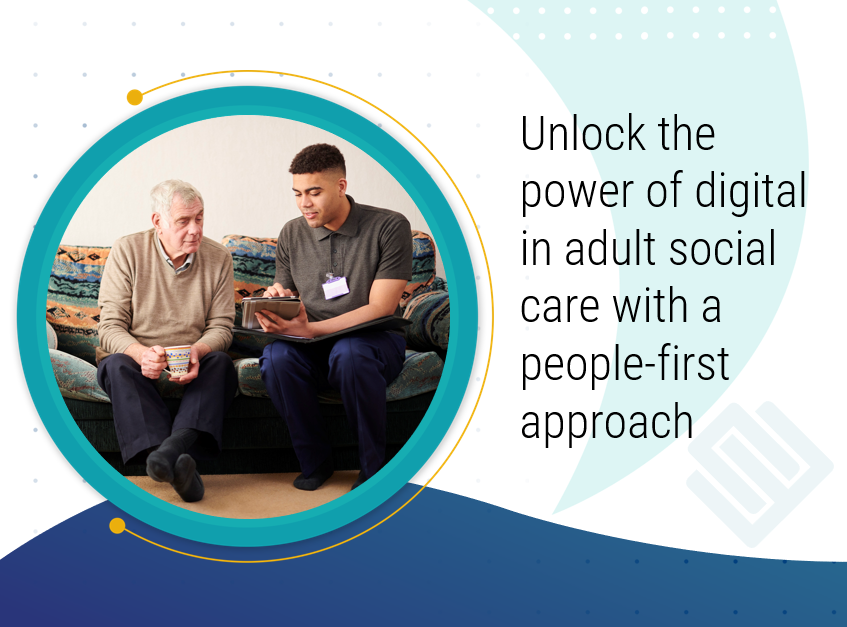A recent article, jointly authored by Ewan King, SCIE and Ralph Cook, Channel 3 called for a greater ambition to embed digital and technology into frontline practice, using a people-first approach.
The article relates to the findings of a survey of frontline practitioners, which had an understandable perspective, but evidence suggests that it is misplaced. Through our own experience, and from findings from across the adult social care sector, we believe technology can in fact improve, rather than hinder, outcomes and strength of relationships when we augment digital into strengths-based practice (SBP) conversations.
Digital can enable the health and care sector to move towards a new model of health and care, from enabling the overall transformation strategy, to optimising the operational environment, maximising independence through technology-enabled care (TEC) and using data to become preventative and intelligence-led.
At Channel 3 we believe there are three key steps to unlocking the cultural barrier towards digital.

Step 1: Build staff confidence and capability
In my experience of working with frontline practitioners in embedding digital as a solution, confidence is achieved by understanding the options available, the capability to use digital as a solution and, most importantly, that the solution can deliver better outcomes for people.
There are practical actions that can be taken to achieve this, such as:
- Invest in the training and development of the workforce.
- Build an infrastructure that supports knowledge sharing within frontline teams. This could include nominating digital champions, adoption of digital platforms (e.g. MS Teams, intranets) and assigning digital workforce roles.
- Collect and publish evidence of the impact and outcomes from using digital solutions.
From personal experience of recently delivering this approach in a large council, it was clear that building staff confidence and capability in digital is a simple, effective and fundamentally important first step.
Step 2: Culturally embed digital within frontline practice
We need to lead a cultural shift in how digital is perceived. In the current climate, positioning digital primarily as a vehicle to free up time for social workers to spend on traditional person-to-person care and support is unhelpful.
This narrative reinforces digital as separate to practice, only looking at the efficiency benefits. To drive the most value out of digital in improving outcomes, we must fundamentally change the conversation staff have with citizens. Digital must be immersed within them. By doing this, we can be more ambitious with what digital can achieve.
Examples of digital immersion for the frontline
To reduce need escalation and crises implement virtual visit capability, intelligence-led support conversations and reviews, and realtime self-management reporting on wellbeing.
Enable seamless access to TEC and community solutions aligned to specific needs.
Information sharing and access supports collaboration and joined-up care across the health and care system, thus improving care planning, support and decision making.
Unlocking this cultural shift is challenging and requires a relentless focus on supporting frontline staff to change ways of working. Channel 3’s people-first approach to digital transformation is specifically designed to address this challenge.
Step 3: Person-led (not technology-led) approach
Too often the attempts to use digital solutions have been technology-led, but winning hearts and minds is a critical part of the cultural change journey. To do this we must focus on the person and strive for positive outcomes, starting with understanding the needs we are looking to address. If a provider develops a solution and then simply drops it into a social care setting, with the hope that it will deliver impact, they are likely to fail.
We understand that the key to success is to start with public and workforce needs, then source or develop digital solutions that meet those needs. This approach improves the likelihood that digital will deliver impact and better outcomes, thus building frontline confidence in embedding digital in every conversation, thus increasing uptake and delivering the scale of adoption we are looking to achieve.
At Channel 3, we work with leaders of adult social care and their frontline teams to unlock these cultural barriers and support the delivery of a digitally enabled and agile workforce.
We look forward to connecting with sector leaders at ADASS Spring Seminar in April and discussing digital transformation. If you would like to discuss how we can help, please contact Stuart Lindsay or Ralph Cook.

Stuart has over 20 years of experience within frontline services and consultancy within health and social care. He specialises in delivering whole system transformational change through independence-focused demand management by embedding strength-based practice, enablers to independence such as technology-enabled care and system performance improvement. The ability to lead teams through the change process has been critical to his achievements.
You can contact Stuart using our online form or via LinkedIn.
